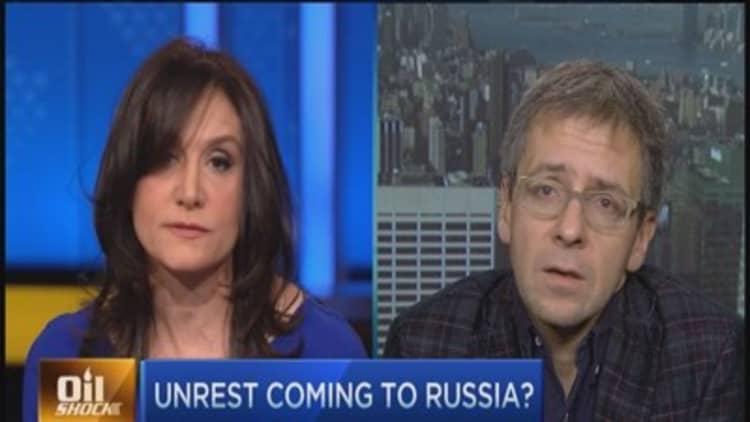Nigeria started 2014 as a darling of investors seeking opportunities in ever more far-flung frontiers, but now the African economy could take a body blow from the oil price decline.
"In a country plagued by deep regional and religious divisions, oil revenue is literally the glue that binds the fractious elites together," RBC Capital said in a note last week, adding that Nigeria is likely the OPEC country with the most immediate risk for civil unrest amid oil price declines. "Nigeria has experienced coups in previous low price environments due in part to drying up patronage funds."
Read More Forgotten OPEC state gains steam—but not for long
It's a major shift from earlier this year when many major European and U.S. multinational companies said they were putting the country at the top of their list of frontier markets where they were considering investments. Nigeria overtook South Africa as Africa's largest economy this year, and investors were eyeing its robust long-term growth prospects, underpinned by the combination of natural resources, an impending demographic dividend and an underpenetrated consumer market.

The country's stock market surged more than 55 percent from the beginning of 2013 through its July peak, but shares have fallen around 23 percent since then as oil prices began a precipitous multi-month slide.
Read More The final investing frontier: Nigerian beer?
Since this summer, Brent has fallen from above $115 per barrel to around $66.05 in Asian trade Tuesday, with many oil analysts predicting prices will continue to slide.
Vulnerable amid overreliance
"Nigeria's overreliance on oil for fiscal and foreign-exchange earnings has left the economy very vulnerable following the sharp decline in oil prices," Barclays said in a note last week.
Despite Nigeria's economy being considered one of sub-Saharan Africa's most diversified, oil and gas contributed around 95 percent of export revenue and around 70 percent of fiscal revenue, Barclays noted.
Read More Will African investments pay off?
Nigeria may lose over $700 million in average annual oil revenue for every dollar decline in prices, the bank estimates, adding it believes the country will swing to a current account deficit next year from a surplus this year.
It expects Nigeria's currency, the naira, to weaken further, with the U.S. dollar likely fetching more than 190 naira in 2015, compared with around 180 naira currently, hurt both by the weaker oil price and a likely escalation of violence in the country.

The central bank has taken tightening measures, with the policy rate now at 13.00 percent, its highest since its 2006 introduction, but Barclays believes these will provide only limited support to the naira, which has shed more than 12 percent of its value against the dollar this year.
Potential for tension
It's a brew that's already spurred the government to cut its spending, and authorities will likely also consider increasing tax rates, Barclays said.
Read More The countries slammed worst by plunging oil prices
Some noted that could exacerbate tensions.
"They're really going to have to cut back on the budget. That's going to be very unpopular locally. It's going to make the tensions between North and South grow," Ian Bremmer, Eurasia Group president, told CNBC last week.
Nigeria also may not be able to use production increases to offset lower oil prices as the country heads toward national elections in February, RBC noted.
"In addition to raiding the ECA [excess crude account] accounts, elites have also turned to crude theft as a way to help finance elections… also more production is shut-in because of the infrastructure damage that accompanies theft as well as the increase in generalized election-related violence around production facilities," it said.
Furthermore, with the military overstretched as it battles an Islamist insurgency in the country's north, it may not be able to contain any election-related unrest, RBC said.
—By CNBC.Com's Leslie Shaffer; Follow her on Twitter @LeslieShaffer1


